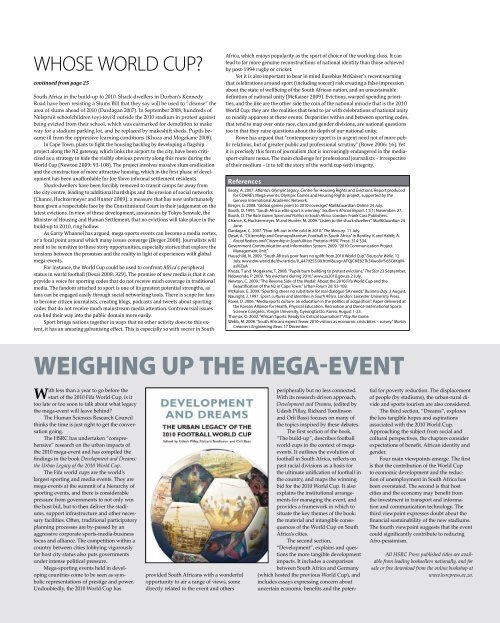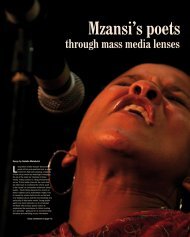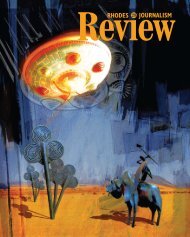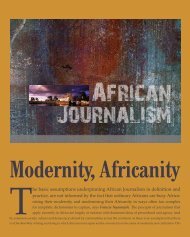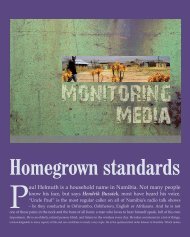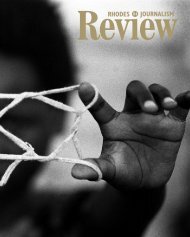Riding on the cup: - Rhodes Journalism Review - Rhodes University
Riding on the cup: - Rhodes Journalism Review - Rhodes University
Riding on the cup: - Rhodes Journalism Review - Rhodes University
Create successful ePaper yourself
Turn your PDF publications into a flip-book with our unique Google optimized e-Paper software.
WHosE WorLd cuP?<br />
c<strong>on</strong>tinued from page 25<br />
South Africa in <strong>the</strong> build-up to 2010. Shack-dwellers in Durban’s Kennedy<br />
Road have been resisting a Slums Bill that <strong>the</strong>y say will be used to “cleanse” <strong>the</strong><br />
area of slums ahead of 2010 (Dardagan 2007). In September 2008, hundreds of<br />
Nelspruit schoolchildren toyi-toyi’d outside <strong>the</strong> 2010 stadium in protest against<br />
being evicted from <strong>the</strong>ir school, which was earmarked for demoliti<strong>on</strong> to make<br />
way for a stadium parking lot, and be replaced by makeshift sheds. Pupils became<br />
ill from <strong>the</strong> oppressive learning c<strong>on</strong>diti<strong>on</strong>s (Khoza and Mogakane 2008).<br />
In Cape Town, plans to fight <strong>the</strong> housing backlog by developing a flagship<br />
project al<strong>on</strong>g <strong>the</strong> N2 gateway, which links <strong>the</strong> airport to <strong>the</strong> city, have been criticised<br />
as a strategy to hide <strong>the</strong> visibly obvious poverty al<strong>on</strong>g this route during <strong>the</strong><br />
World Cup (Newt<strong>on</strong> 2009: 93-108). The project involves massive slum eradicati<strong>on</strong><br />
and <strong>the</strong> c<strong>on</strong>structi<strong>on</strong> of more attractive housing, which in <strong>the</strong> first phase of development<br />
has been unaffordable for Joe Slovo informal settlement residents.<br />
Shack-dwellers have been forcibly removed to transit camps far away from<br />
<strong>the</strong> city centre, leading to additi<strong>on</strong>al hardships and <strong>the</strong> erosi<strong>on</strong> of social networks<br />
(Chance, Huchzermeyer and Hunter 2009): a measure that has now unfortunately<br />
been given a respectable face by <strong>the</strong> C<strong>on</strong>stituti<strong>on</strong>al Court in <strong>the</strong>ir judgement <strong>on</strong> <strong>the</strong><br />
latest evicti<strong>on</strong>s. In view of <strong>the</strong>se development, assurances by Tokyo Sexwale, <strong>the</strong><br />
Minister of Housing and Human Settlement, that no evicti<strong>on</strong>s will take place in <strong>the</strong><br />
build-up to 2010, ring hollow.<br />
As Garry Whannel has argued, mega-sports events can become a media vortex,<br />
or a focal point around which many issues c<strong>on</strong>verge (Berger 2008). Journalists will<br />
need to be sensitive to <strong>the</strong>se story opportunities, especially stories that explore <strong>the</strong><br />
tensi<strong>on</strong>s between <strong>the</strong> promises and <strong>the</strong> reality in light of experiences with global<br />
mega-events.<br />
For instance, <strong>the</strong> World Cup could be used to c<strong>on</strong>fr<strong>on</strong>t Africa’s peripheral<br />
status in world football (Desai 2008: 329). The promise of new media is that it can<br />
provide a voice for sporting codes that do not receive much coverage in traditi<strong>on</strong>al<br />
media. The fandom attached to sport is <strong>on</strong>e of its greatest potential strengths, as<br />
fans can be engaged easily through social networking tools. There is scope for fans<br />
to become citizen journalists, creating blogs, podcasts and tweets about sporting<br />
codes that do not receive much mainstream media attenti<strong>on</strong>. C<strong>on</strong>troversial issues<br />
can find <strong>the</strong>ir way into <strong>the</strong> public domain more easily.<br />
Sport brings nati<strong>on</strong>s toge<strong>the</strong>r in ways that no o<strong>the</strong>r activity does: to this extent,<br />
it has an amazing galvanising effect. This is especially so with soccer in South<br />
With less than a year to go before <strong>the</strong><br />
start of <strong>the</strong> 2010 Fifa World Cup, is it<br />
too late or too so<strong>on</strong> to talk about what legacy<br />
<strong>the</strong> mega-event will leave behind?<br />
The Human Sciences Research Council<br />
thinks <strong>the</strong> time is just right to get <strong>the</strong> c<strong>on</strong>versati<strong>on</strong><br />
going.<br />
The HSRC has undertaken “comprehensive”<br />
research <strong>on</strong> <strong>the</strong> urban impacts of<br />
<strong>the</strong> 2010 mega-event and has compiled <strong>the</strong><br />
findings in <strong>the</strong> book Development and Dreams:<br />
<strong>the</strong> Urban Legacy of <strong>the</strong> 2010 World Cup.<br />
The Fifa world <strong>cup</strong>s are <strong>the</strong> world’s<br />
largest sporting and media events. They are<br />
mega-events at <strong>the</strong> summit of a hierarchy of<br />
sporting events, and <strong>the</strong>re is c<strong>on</strong>siderable<br />
pressure from governments to not <strong>on</strong>ly win<br />
<strong>the</strong> host bid, but to <strong>the</strong>n deliver <strong>the</strong> stadiums,<br />
support infrastructure and o<strong>the</strong>r necessary<br />
facilities. Often, traditi<strong>on</strong>al participatory<br />
planning processes are by-passed by an<br />
aggressive corporate sports-media-business<br />
focus and alliance. The competiti<strong>on</strong> within a<br />
country between cities lobbying vigorously<br />
for host city status also puts governments<br />
under intense political pressure.<br />
Mega-sporting events held in developing<br />
countries come to be seen as symbolic<br />
representati<strong>on</strong>s of prestige and power.<br />
Undoubtedly, <strong>the</strong> 2010 World Cup has<br />
provided South Africans with a w<strong>on</strong>derful<br />
opportunity to air a range of views, some<br />
directly related to <strong>the</strong> event and o<strong>the</strong>rs<br />
Africa, which enjoys popularity as <strong>the</strong> sport of choice of <strong>the</strong> working class. It can<br />
lead to far more genuine rec<strong>on</strong>structi<strong>on</strong>s of nati<strong>on</strong>al identity than those achieved<br />
by post-1994 rugby or cricket.<br />
Yet it is also important to bear in mind Eusebius McKaiser’s recent warning<br />
that celebrati<strong>on</strong>s around sport (including soccer) risk creating a false impressi<strong>on</strong><br />
about <strong>the</strong> state of wellbeing of <strong>the</strong> South African nati<strong>on</strong>, and an unsustainable<br />
definiti<strong>on</strong> of nati<strong>on</strong>al unity (McKaiser 2009). Evicti<strong>on</strong>s, warped spending priorities,<br />
and <strong>the</strong> like are <strong>the</strong> o<strong>the</strong>r side <strong>the</strong> coin of <strong>the</strong> nati<strong>on</strong>al miracle that is <strong>the</strong> 2010<br />
World Cup; <strong>the</strong>y are <strong>the</strong> realities that tend to jar with celebrati<strong>on</strong>s of nati<strong>on</strong>al unity<br />
so readily apparent at <strong>the</strong>se events. Disparities within and between sporting codes,<br />
that tend to map over <strong>on</strong>to race, class and gender divisi<strong>on</strong>s, are nati<strong>on</strong>al questi<strong>on</strong>s<br />
too in that <strong>the</strong>y raise questi<strong>on</strong>s about <strong>the</strong> depth of our nati<strong>on</strong>al unity.<br />
Rowe has argued that “c<strong>on</strong>temporary sport is in urgent need not of more public<br />
relati<strong>on</strong>s, but of greater public and professi<strong>on</strong>al scrutiny” (Rowe 2006: 16). Yet<br />
it is precisely this form of journalism that is increasingly endangered in <strong>the</strong> mediasport-culture<br />
nexus. The main challenge for professi<strong>on</strong>al journalists – irrespective<br />
of <strong>the</strong>ir medium – is to tell <strong>the</strong> story of <strong>the</strong> world <strong>cup</strong> with integrity.<br />
References<br />
Beaty, A. 2007. Atlanta’s Olympic Legacy. Centre for Housing Rights and Evicti<strong>on</strong>s. Report produced<br />
for COHRE’s Mega-events, Olympic Games and Housing Rights project, supported by <strong>the</strong><br />
Geneva Internati<strong>on</strong>al Academic Network.<br />
Berger, G. 2008. “Global games point to 2010 coverage.” Mail&Guardian Online 24 July.<br />
Booth, D. 1995. “South Africa: elite sport is winning.” Sou<strong>the</strong>rn African Report. 11(1) November: 27.<br />
Booth, D. The Race Game: Sport and Politics in South Africa. L<strong>on</strong>d<strong>on</strong>: Frank Cass Publishers.<br />
Chance, K, Huchzermeyer, M and Hunter, M. 2009. “Listen to <strong>the</strong> shack-dwellers”. Mail&Guardian 24<br />
June.<br />
Dardagan, C. 2007. “Poor left out in <strong>the</strong> cold in 2010.” The Mercury. 11 July.<br />
Desai, A. “Citizenship and Cosmopolitanism: Football in South Africa” in Bentley, K and Habib, A.<br />
Racial Redress and Citizenship in South Africa. Pretoria: HSRC Press: 314-334.<br />
Government Communicati<strong>on</strong> and Informati<strong>on</strong> System. 2009. “2010 Communicati<strong>on</strong> Project<br />
Management Unit.”<br />
Hauschild, N. 2009. “South Africa’s poor fears no uplift from 2010 World Cup.” Deutsche Welle. 12<br />
July. www.dw-world.de/dw/article/0,,4470255,00.html&usg=AFQjCNE82Tk3Xwo8vY-65OtKqMasl0ZuA<br />
Khoza, T and Mogakane, T. 2008. “Pupils burn building to protest evicti<strong>on</strong>s.” The Star 23 September.<br />
Ndow<strong>on</strong>de, P. 2009. “No evicti<strong>on</strong>s during 2010.” www.sa2010.gov.za 2 July.<br />
Newt<strong>on</strong>, C. 2009. “The Reverse Side of <strong>the</strong> Medal: About <strong>the</strong> 2010 Fifa World Cup and <strong>the</strong><br />
Beautificati<strong>on</strong> of <strong>the</strong> N2 in Cape Town.” Urban Forum 20: 93-108.<br />
McKaiser, E. 2009. “Sporting cheer no substitute for real dialogue SA needs.” Business Day. 3 August.<br />
Nauright, J. 1997. Sport, cultures and identities in South Africa. L<strong>on</strong>d<strong>on</strong>: Leicester <strong>University</strong> Press.<br />
Rowe, D. 2006. “Media sports culture: an educati<strong>on</strong> in <strong>the</strong> politics of acquisiti<strong>on</strong>”. Paper delivered at<br />
<strong>the</strong> Korean Alliance for Health, Physical Educati<strong>on</strong>, Recreati<strong>on</strong> and Dance Internati<strong>on</strong>al Sports<br />
Science C<strong>on</strong>gress, Y<strong>on</strong>gin <strong>University</strong>, Gye<strong>on</strong>gGi-Do, Korea. August 1-23.<br />
Thomas, O. 2002. “African Sports: Ready for Critical <strong>Journalism</strong>?” Play <strong>the</strong> Game.<br />
Webb, M. 2008. “South Africans expect fewer 2010 visitors as ec<strong>on</strong>omic crisis bites – survey.” Martin<br />
Creamer’s Engineering News 17 December.<br />
WeiGhinG Up The meGa-evenT<br />
peripherally but no less c<strong>on</strong>nected.<br />
With its research-driven approach,<br />
Development and Dreams, (edited by<br />
Udesh Pillay, Richard Tomlins<strong>on</strong><br />
and Orli Bass) focuses <strong>on</strong> many of<br />
<strong>the</strong> topics inspired by <strong>the</strong>se debates.<br />
The first secti<strong>on</strong> of <strong>the</strong> book,<br />
“The build-up”, describes football<br />
world <strong>cup</strong>s in <strong>the</strong> c<strong>on</strong>text of megaevents.<br />
It outlines <strong>the</strong> evoluti<strong>on</strong> of<br />
football in South Africa, reflects <strong>on</strong><br />
past racial divisi<strong>on</strong>s as a basis for<br />
<strong>the</strong> ultimate unificati<strong>on</strong> of football in<br />
<strong>the</strong> country, and maps <strong>the</strong> winning<br />
bid for <strong>the</strong> 2010 World Cup. It also<br />
explains <strong>the</strong> instituti<strong>on</strong>al arrangements<br />
for managing <strong>the</strong> event, and<br />
provides a framework in which to<br />
situate <strong>the</strong> key <strong>the</strong>mes of <strong>the</strong> book:<br />
<strong>the</strong> material and intangible c<strong>on</strong>sequences<br />
of <strong>the</strong> World Cup <strong>on</strong> South<br />
Africa’s cities.<br />
The sec<strong>on</strong>d secti<strong>on</strong>,<br />
“Development”, explains and questi<strong>on</strong>s<br />
<strong>the</strong> more tangible development<br />
impacts. It includes a comparis<strong>on</strong><br />
between South Africa and Germany<br />
(which hosted <strong>the</strong> previous World Cup), and<br />
includes essays expressing c<strong>on</strong>cern about<br />
uncertain ec<strong>on</strong>omic benefits and <strong>the</strong> poten-<br />
tial for poverty reducti<strong>on</strong>. The displacement<br />
of people (by stadiums), <strong>the</strong> urban-rural divide<br />
and sports tourism are also c<strong>on</strong>sidered.<br />
The third secti<strong>on</strong>, “Dreams”, explores<br />
<strong>the</strong> less tangible hopes and aspirati<strong>on</strong>s<br />
associated with <strong>the</strong> 2010 World Cup.<br />
Approaching <strong>the</strong> subject from social and<br />
cultural perspectives, <strong>the</strong> chapters c<strong>on</strong>sider<br />
expectati<strong>on</strong>s of benefit, African identity and<br />
gender.<br />
Four main viewpoints emerge. The first<br />
is that <strong>the</strong> c<strong>on</strong>tributi<strong>on</strong> of <strong>the</strong> World Cup<br />
to ec<strong>on</strong>omic development and <strong>the</strong> reducti<strong>on</strong><br />
of unemployment in South Africa has<br />
been overstated. The sec<strong>on</strong>d is that host<br />
cities and <strong>the</strong> ec<strong>on</strong>omy may benefit from<br />
<strong>the</strong> investment in transport and informati<strong>on</strong><br />
and communicati<strong>on</strong> technology. The<br />
third viewpoint expresses doubt about <strong>the</strong><br />
financial sustainability of <strong>the</strong> new stadiums.<br />
The fourth viewpoint suggests that <strong>the</strong> event<br />
could significantly c<strong>on</strong>tribute to reducing<br />
Afro-pessimism.<br />
All HSRC Press published titles are available<br />
from leading booksellers nati<strong>on</strong>ally, and for<br />
sale or free download from <strong>the</strong> <strong>on</strong>line bookshop at<br />
www.hsrcpress.ac.za.


